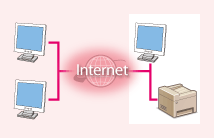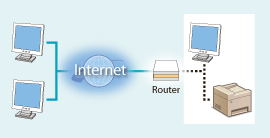
Preventing Unauthorized Access
This section describes the security measures on how to prevent unauthorized access from the external network. This is a must-read for all users and administrators before using this machine, other printers, and multifunction machines connected to the network. In recent years, a printer/multifunction machine connected to the network can offer you a variety of useful functions, such as printing from a computer, operating from a computer using the remote function, and sending scanned documents via the Internet. On the other hand, it is essential to take security measures to reduce the security risk for information leakage, as a printer/multifunction machine has become more exposed to threats, such as unauthorized access and theft, when it is connected to the network. This section explains necessary settings you need to specify to prevent unauthorized access before using a printer/multifunction machine connected to the network.
Security Measures to Prevent Unauthorized Access from the External Network
Assigning a Private IP Address
An IP address is a numerical label assigned to each device participating in a computer network. A "global IP address" is used for the communication connecting to the Internet, and a "private IP address" is used for the communication within a local area network, such as a LAN in the company. If a global IP address is assigned, your printer/multifunction machine is open to the public and can be accessed via the Internet. Thus, the risk of information leakage due to unauthorized access from external network increases. On the other hand, if a private IP address is assigned, your printer/multifunction machine is closed to a local area network and can be accessed by only users on your local area network, such as a LAN in the company.
 |  | |
Global IP Address Can be accessed from the external network | Private IP Address Can be accessed from the users within a local area network |
Basically, assign a private IP address to your printer/multifunction machine. Make sure to confirm the IP address, assigned to the printer/multifunction machine you are using, is a private IP address or not. A private IP address is found in one of the following ranges.
 Ranges for Private IP addresses
Ranges for Private IP addresses
From 10.0.0.0 to 10.255.255.255
From 172.16.0.0 to 172.31.255.255
From 192.168.0.0 to 192.168.255.255
For information on how to confirm the IP address, see Setting IPv4 Address.
 If a global IP address is assigned to a printer/multifunction machine, you can create a network environment to reduce the risk of unauthorized access by installing security software, such as a firewall that prevents access from the external networks. If you want to assign a global IP address to and use a printer/multifunction machine, contact your network administrator. |
Using Firewall to Restrict Transmission
A firewall is a system that prevents unauthorized access from the external networks and protects against attacks/intrusions to a local area network. You can use a firewall on your network environment to block access from the external network that appears to be dangerous, by restricting communication from specified IP address of the external network. The function installed to a Canon printer/multifunction machine enables you to set up the IP address filter. For information on how to set up an IP address filter, see Specifying IP Addresses for Firewall Settings.
Specifying the TLS Encrypted Communication
For information on the TLS Encrypted Communication, see Configuring the Network Security Settings, and on the procedures to specify, see Configuring the Key and Certificate for TLS.
Setting PIN to Manage Information Stored in the Multifunction Machine
If a malicious third party attempts to gain unauthorized access to a printer/multifunction machine, setting PIN to information stored in the machine will reduce the risk of information leakage. Canon printers/multifunction machines enable you to protect various type of information by setting PIN.
 Setting PIN to Each Function
Setting PIN to Each Function
Setting PIN for Using Remote UI
For more information, see Setting a Remote UI PIN.
For more information, see Setting a Remote UI PIN.
Setting PIN for the System Manager Settings
For more information, see Setting the System Manager ID and PIN.
For more information, see Setting the System Manager ID and PIN.
Address Book PIN
For more information on setting a PIN, see Restricting Use of the Address Book.
For more information on setting a PIN, see Restricting Use of the Address Book.
Listed above are some examples of security measures for preventing unauthorized access. For more information on the other security measures, see Managing the Machine and take necessary security measures for preventing unauthorized access to suit your environment.